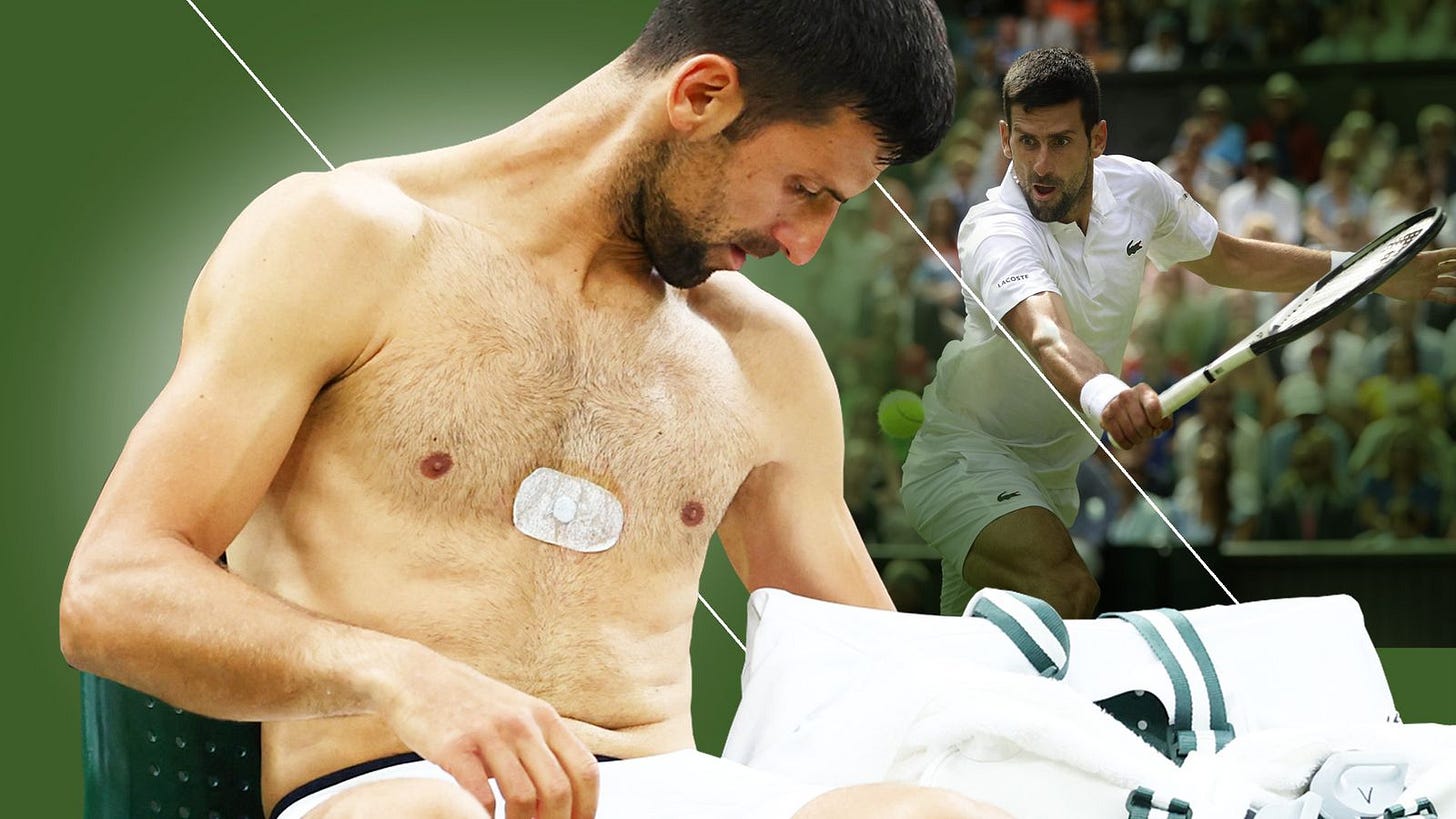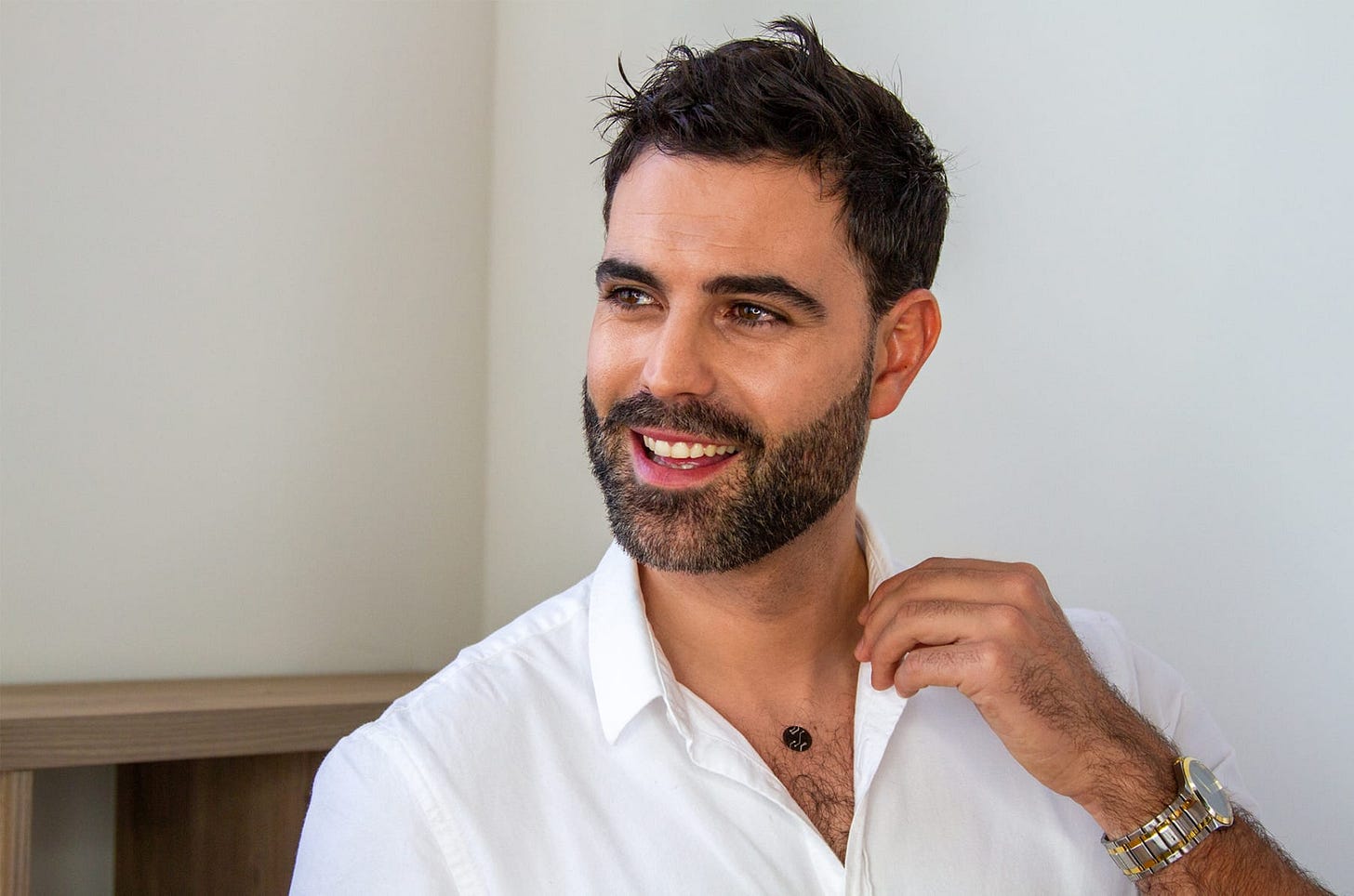Did Novak Djokovic Swallow the Magical Coin That Gives Him Powers?
An Existential Investigation
This past summer, after defeating the top-ranked Carlos Alcaraz in the longest three-set men’s final in the history of the ATP Tour, Novak Djokovic took off his shirt and revealed, to the dismay of fans and detractors around the globe, that there was no magical coin taped between his nipples. The lung-buster match, which saw both players struggling to cope with the stovetop-scalding court conditions in Cincinnati, lasted three hours and 49 minutes; at its conclusion, Alcaraz was 20 years old; Djokovic was 36. In a sport where youthful endurance and reflex tend to trade at higher premiums than strategy and experience, turning 30 usually signals the commencement of a player’s post-prime decline. (Even Jimmy Connors, who won an ATP title at 39 and retired from pro tennis at 43, never won a Grand Slam after turning 31.) Watching the Cincinnati final, however, any disparity in athleticism between the two players would not have been apparent, but such is the confounding sleight of hand that has defined late-career Djokovic: He can take nearly two decades of physical and psychological wear-and-tear and, before your disbelieving eyes, make it disappear completely.
That Djokovic wasn’t wearing a magical coin between his nipples made the feat of beating Alcaraz in Cincinnati that much more impressive and intriguing. Djokovic was first seen wearing the mysterious object at the 2023 French Open, a tournament where the most memorable match, another battle between Djokovic and Alcaraz, was barely competitive at all. With the back-and-forth semifinal tied at one set a piece, Alcaraz had been beset by cramps that reduced one of the most fleet-footed, aggressive players on the tour to a sad statue holding a Babolat Pure Aero. The rest of the match was an anticlimactic formality, the only drama deriving from the Parisian crowd booing Djokovic’s persistent intensity in the face of his hobbled, humbled opponent. Two days later, Djokovic won the French for a third time, bringing his Grand Slam total to a record-breaking 23 titles, one more than his chief generational rival, Rafael Nadal.
As milestone victories kept piling up for Djokovic, so too did the general curiosity about the weird coin taped to his chest. When asked about the origins and nature of the coin during a press conference in the earlier rounds of the French Open, Djokovic had offered the following explanation: “When I was a kid I liked Iron Man a lot, so I try to impersonate Iron Man. My team delivers incredibly efficient nanotechnology to help me deliver my best. That’s probably the biggest secret of my career. If it wasn’t for that, I probably wouldn’t be sitting here.”
Spurred by these cryptic (but not uncharacteristic) responses from Djokovic, subsequent investigations by SkyNews and other outlets identified the coin as a “human upgrade device” produced by Tao Technologies, an Italian tech startup whose website claims that its patented “TaoPatch” allows the wearer to achieve “true balance” by using “two layers of nanocrystals that turn heat from your body into light.” The TaoPatch’s inventor, Fabio Fontana, developed his product “to help himself recover from a car accident that he found himself in and get relief from the pain of his injuries.” Beyond the purported edge it offers to athletes, the TaoPatch supposedly alleviates the symptoms of MS and Parkinson’s Disease, though the studies evidencing these claims have been scrutinized by skeptics. “The notion that it provides any benefit is bogus,” said Edzard Ernst, a professor of complementary medicine at the University of Exeter. “The principles fly in the face of science.”
Whether the benefits of its nanocrystals were genuine, nonexistent, or placebo effect, Djokovic would continue wearing the TaoPatch through Wimbledon, where he again played Alcaraz in an instant-classic final. Alcaraz won that match in five sets, and sometime between Wimbledon and Cincinnati, Djokovic stopped wearing the TaoPatch and, presumably to the consternation of Fabio Fontana, started playing some scandalously dominant tennis. After ditching the TaoPatch and raising the trophy in Cincinnati, Djokovic won the US Open and the Rolex Paris Masters, reclaiming the World #1 ranking from Alcaraz in the process. Even by Djokovic’s exalted standards, it was quite a run. It made me wonder if he might have swallowed the magical coin that gives him powers.
As preposterous as that thought may sound, it would be tough to argue against its underlying assertion: that there is no player on the ATP or WTA tours likelier to swallow an Italian-made woo-woo biohacking device than Djokovic. In “Novak Djokovic is the GOAT,” one of the best pieces on Djokovic’s complicated place on Tennis Mount Rushmore, Giri Nathan illustrates how Djokovic’s off-court pseudo-science and his on-court science are two halves of a whole, describing the Serb’s game in terms that evoke the disruptive, system-unmaking effects of entropy, and rightly so. “Perhaps no athlete has evoked inevitability more acutely than Novak Djokovic,” Nathan writes. “Even when the scoreboard shows him trailing badly, he feels somehow like the favorite.”
Discourse and terminology from the STEM fields—statistics, DIY biology, geometry—are often relied on when writers and commentators talk about what sets Djokovic a notch above the two default alternatives in the endless (and enervating) GOAT debate, Nadal and Roger Federer. Considerable ink and breath have been wasted on Djokovic’s unrivaled shot quality, his seemingly 0-BPM heart rate in tiebreaks, the vegan gluten-free diet and the yoga splits and his enthusiasm for trampoline rebound therapy. That all sounds pretty nuts—if only his results didn’t provide sufficient evidence to have your Polio immunity removed from your bloodstream. Within a match, the suffocating consistency of Djokovic’s strokes has an objectively entropic impact on his opponents, leaving top players beaten in a blink and reduced to tears, and that point/game/match/tournament-warping entropy has reshaped the GOAT debate as well. The off-court optics and on-court performance are mutually reinforcing, working together to tilt the argument in Novak’s favor.
Djokovic’s self-consuming drive to optimize his mind and body by any means necessary, especially as he has aged, is now so well-publicized that it comes prepackaged into any claim that he is the greatest tennis player of all-time—and that is by careful design. The logic: Yes, Djokovic has raised more Grand Slams and Masters 1000 trophies than anyone ever, but he also worked harder than anyone else to earn those trophies, including Federer and Nadal. This narrative is profoundly compelling in a sports media ecosystem—and a wider capitalist culture grounded in the Protestant ethic—that fetishizes “hard work” and “winning.” While Nadal spent his free time fishing for sea bass off the coast of Spain, Djokovic was learning how to purify a glass of polluted water with ESP. When Federer was strategically investing in Swiss sneaker companies, Djokovic was laying slices of white bread on his stomach to prove that they made him weaker. Still not buying it? Ask yourself who else would be stupid- brilliant enough to wear a worthless $1900 coin between their nipples in public.
From this vantage, we can see how the TaoPatch reinforced a story that Djokovic has been telling since his early career, a manufactured narrative that reached its crescendo—and became a truth universally acknowledged—with his refusal to take the COVID-19 vaccine. In making the “self-defeating” choice to skip tournaments rather than get vaccinated, Djokovic understood, not incorrectly, that “staying true” to his snake oil holistic health plan was worth more to his side of the GOAT Argument than winning three additional Grand Slams. The choice distinguished him from his peers literally and symbolically, as Djokovic remains the only male player in the top 100 who hasn’t received the coronavirus jab. That I could be convinced that Djokovic swallowed the magical coin means that, at least in the sense that matters most to him, he has already won.
Absent from Djokovic’s calculus, however, is the unfortunate reality that only born losers care about what other people think about them to this maniacal degree. In that regard, Djokovic could win his 100th Grand Slam blindfolded and, for me, his irrefutable greatness would still pale in comparison to the greatnesses of Federer and Nadal. For them, winning was the unintended consequence, not the ultimate goal, of the pure pursuit of play, of athletic competition elevated to collaborative art form, and I will always opt for reading prose and poetry over the explication of a scientific proof.
The key difference: When Federer and Nadal lay their heads against their pillows at night, they sleep heavy and dream of fishing boats on the open sea, of sneakers with insoles as soft as clouds. Meanwhile, a small part of Novak Djokovic, even in his deepest slumber, lies awake and restless, thinking and thinking and thinking about the two of them. Federer and Nadal intuitively comprehend what the likes of Djokovic, Elon Musk, and Lin-Manuel Miranda will sacrifice everything refusing to accept. For these great men of sport and industry and culture, there is no tougher coin to swallow than the fact, proven in the soul and the heart, that all the science and pseudo-science in the world will never produce a cure for being a loser.







Beautiful. And convincing!
Wow. 💯